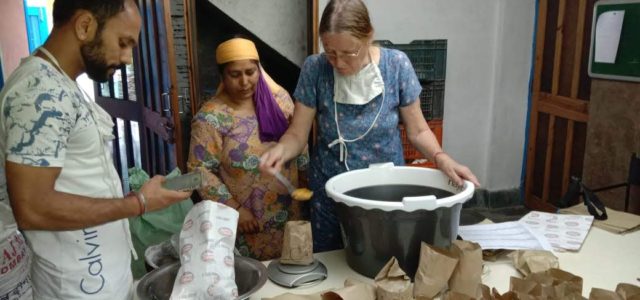During the past 3 months our normal activities have been restricted due to the corona virus pandemic. However, we have been working hard to stay in contact with the local community and responding to their critical needs as best we can. Dr Barbara has unwaveringly kept the clinic open, at first only for the few hours in the morning when people were allowed to be out for essential purposes, and by June, full time. Despite the prevalent fear and uncertainty, our staff have bravely welcomed everyone who came in need of medical help, offering them advice, soap and masks to help them protect themselves and their families.
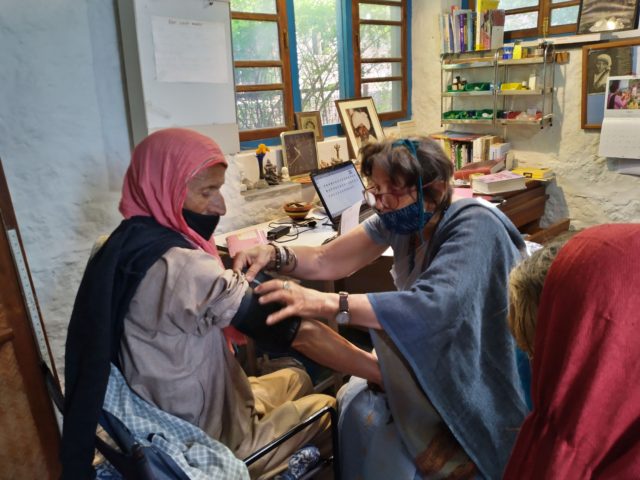
We have been keeping an eye on our children with special needs, visiting Sanjoli and Alka and enabling those who live further afield like Bhagwanti to visit us. We have providing extra food and materials as needed to these children. The physiotherapy centre at Tapovan has been closed so we have suspended our transport service. For Shaksham whose mother is extremely anxious that he should continue to make the progress he has been achieving over the past year, we have organised WhatsApp sessions with one of the Tapovan physiotherapists twice a week. We also provided him with a suitable tricycle to ride as he can safely sit and move his legs and it will exercise his weak core and give him a lot of fun. The twins were unable to receive their hormone therapy for almost two months, but are back on their treatment now and visit the clinic regularly.
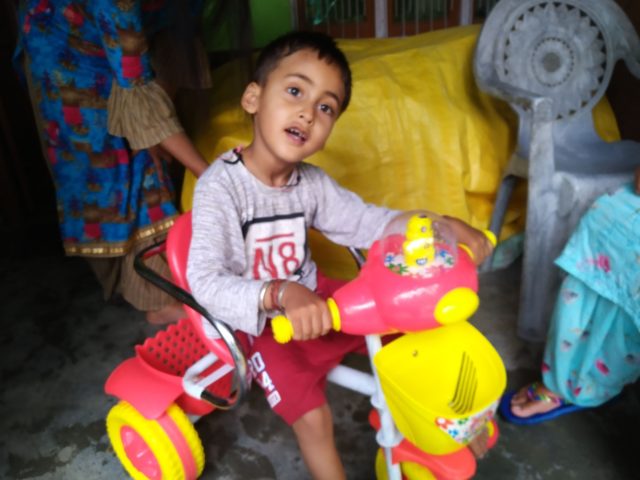
We have taken note of the patients who attended the clinic during May, the second month of the lockdown. The following chart shows that almost all were from the immediate locality with only 10 patents from as far away as Dharamsala and 8 from “Other” which are the villages between Dharamsala and here. This is because of the lack of transport, all buses and taxi services where suspended at this time, both to get to our clinic and to access other medical facilities further afield. It assures us that the services we are providing for the local people, particularly during these difficult times, are required and worth the risks our staff accept.
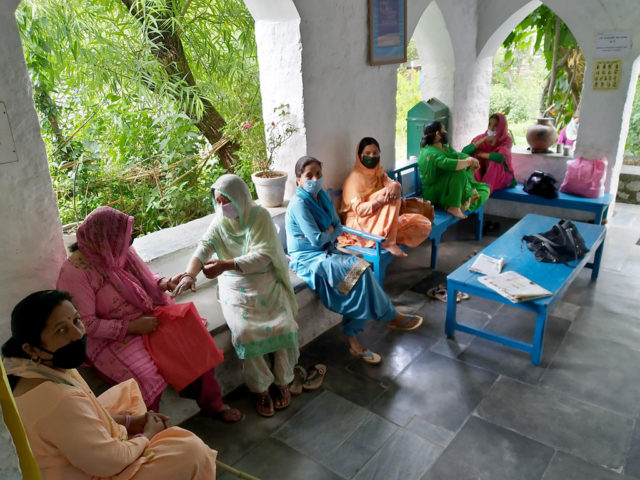
May 2020 – Location of Individual Patients
| Rakkar | Yol | Khaniyara | Sidhbari | Dharamsala | Sidhpur | other | Total |
| 158 | 55 | 68 | 11 | 10 | 12 | 8 | 322 |
Whilst last year we had only 298 consultations in the clinic during May, this year we had 372. These figures include the number of people who came several times during the month.
We also looked at the gender balance which is very similar to last year, showing that it is primarily but not certainly exclusively, the women of the village who come to the clinic for medical attention.
| Female | Male | Male Child | Female Child | Total |
| 260 | 86 | 13 | 13 | 372 |
| 70% | 23% | 3% | 3% |
We are surprised by the age range of our patients. Whilst we are inclined to think we have more elderly patients, the statistics show that we actually see a very broad range of ages, reflecting the natural illness rate according to age in the village. Indeed, this highlights that the proportion of very old patients is very small even now here in rural India.
We made a short video in the clinic which is posted on Facebook.
Unfortunately the Health Education Outreach Clinics have been suspended for the time being.
Our Staff: Whilst we have continued to pay all our employees, they were unable to work full time for the first 6 weeks of lockdown. As the situation eased, so they were all able to come to work for longer hours and by the end of June, all, including Ravindra who has the farthest to travel, were able to attend work full time. We are very pleased that our staff continued to work as much as they could so we were able to keep the clinic open and take up the task of making sure everyone in need received sufficient food to eat. Those who were unable to do their normal work put in many hours of hard work in the Nishtha organic garden which has come along well. The calendula bloomed and has been made into ointment, potatoes and onions were dug and distributed to families in need along with the dry ration packages and the wheat has been harvested. We are now into the new season of rice and vegetables such as ladies fingers, beans and squash. The turmeric on the land is growing well and the tea bushes planted last year are looking very healthy.
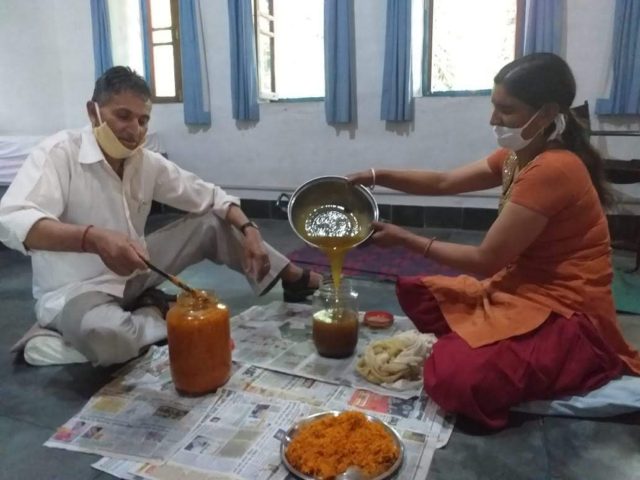
The Single Women who very often live in quite isolated situations in the villages have been much on our minds during this period. Fortunately they almost all have pensions paid regularly into their accounts and were able to benefit from the government rations, therefore they have not been in extreme difficulties. However, fear and uncertainty about the situation and being unable to get medical attention is a source of concern. Our single women’s team started visiting the women in their areas as soon as the lock down was eased. Their first effort was to make sure that everyone has a Himcare health card and to check if everyone had been getting their government rations. People are very often unaware that it is not enough to just have a health card, it needs to be kept up to date in order for it to be of any benefit should she get sick. We have been distributing soap and masks to the single women and explaining how they can protect themselves from the virus. A video of the interaction between our single women activists and the women they met during May was made and posted on facebook on 2nd June.
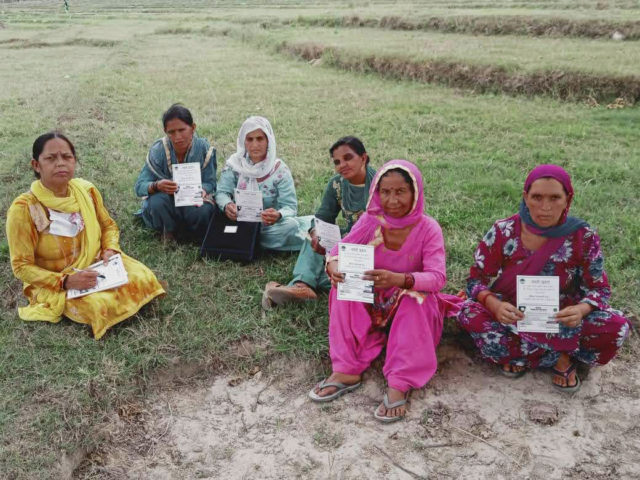
One of the first projects to re-start was the plastic collection and brick making. Our team found that after 6 weeks lockdown that there was plenty of waste plastic in the village to collect and there is demand for our bricks from a local architect who is using them in an environmentally aware building project. The team is therefore working steadily to make blocks. With our collection and the reduced amount of purchasing of plastic packaged products in the village, we are feeling remarkably smart and clean these days!
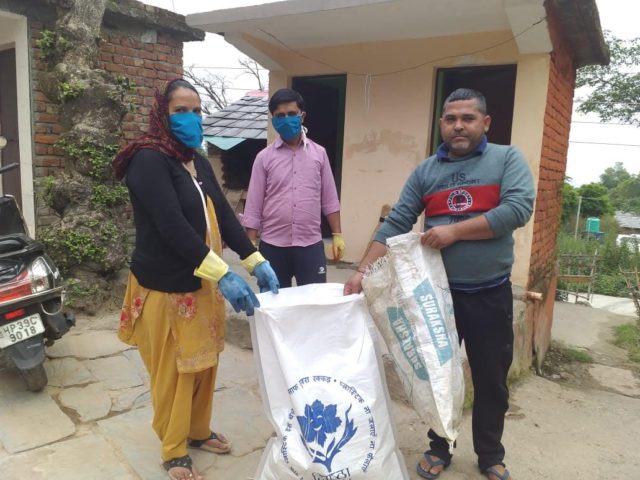
COVID Relief program
During the initial lockdown it was extremely difficult to find out how people were coping and as our vehicles did not have COVID passes we were unable to venture out. However, in May we were able to get a pass and our drivers started helping Jagori, our sister organisation distributing food packages to needy people. These particularly included the Kashmiri labourer’s families who were observing Ramadan who had lost their income and were trying to get back to Kashmir. We then assisted Jagori in delivering nutritious food supplements to teenage girls who they had identified in the outlying villages of Kangra district. Girls in the villages are almost all extremely thin and anaemic because the men and boys get fed first in the family, leaving very little for the young girls. Therefore Jagori have a program which provides nutritional supplements and personal items to the girls from the poorest families. This entailed several quite stressful trips for our ambulance into very backward areas with poor roads delivering packets to 570 girls.
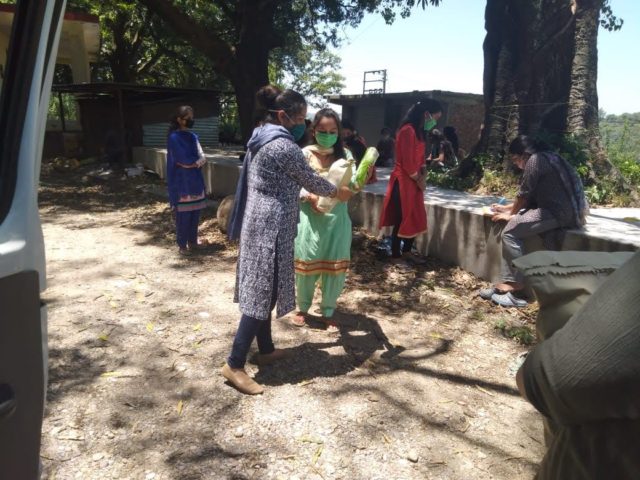
In the meantime, Vijay Bhadwaj along with Vandhana, our newest single women activist undertook a survey of the scattered villages on the mountainside above Rakkar. They identified 32 single women who we had never previously encountered because of their remoteness. Many earn through daily labour and others work as domestic helpers in middle class families in Dharamsala and Yol. Because they were all at home, this was a good occasion to find and meet them all. Subsequently in June our team held a very interesting and productive meeting with them.
Our visits to these areas alerted us to the fact that many families were suffering great hardship because they either didn’t have a ration card or the ration they were able to pick up from the government depots was insufficient to their needs. We therefore, with the help of Jagori who are now expert in ordering the supplies and making up the packages, assisted 88 families by delivering essential food items to them. Funding for this was provided by a kind local donor.
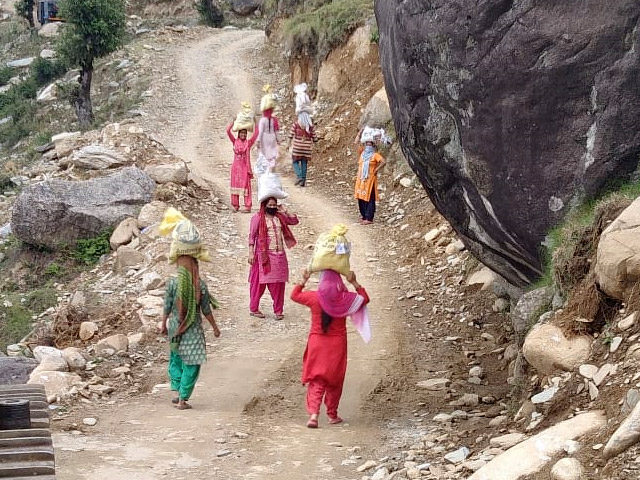
School Feeding Program (April to June) 2020
| School | No. of Students | May | June | TOTAL COST |
| Chakwan | 27 | 5,224 | 5,562 | 10,786 |
| Saletgodam | 20 | 3,870 | 3,927 | 7,797 |
| Rakkar | 26 | 5,031 | 8,240 | 13,271 |
| Andrar | 25 | 4,837 | 4,114 | 8,951 |
| Mohli | 36 | 6,966 | 7,630 | 14,596 |
| Others | 16 | 4,184 |
| 4,184 |
| Total | 150 | 30,112 | 29,473 | 59,585 |
| Fuel |
|
|
| 3,200 |
| Packing Material |
|
|
| 324 |
| Spare Material |
|
|
| 8,841 |
| TOTAL Spent: |
|
|
| 71,950 |
By the end of May we had started planning a program to provide nutritionally rich snacks to the 150 primary school children from Rakkar, Mohli and the villages above us. We decided to visit each school area every two weeks and distribute snack packages made up of a variety of roasted channa, peanuts, raisins dried dates, soya nutri nuggets and fruit. Packages have also been provided for our children with special needs and some who come to the clinic who are not studying at one of the schools or who are older but equally in need. Each package costs approximately Rs.200. So far the costs have been taken from our usual school nutrition program sponsored by Nishtha Germany. The packages have been very happily received by the children and their parents who agreed to hand small amounts out daily to their child to make it last the two weeks.
Our staff take great pleasure in this program and have enjoyed meeting the children after so long. On our first visit the children were very subdued and worried about the situation, confined as they are to the area around their houses and unable to go to school and meet their teachers and friends. We then decided to try to provide some simple activities for them to do and so on the second occasion we gave each child a drawing book and colours and suggested they draw rainbows and things they really like. The results are lovely! Since the schools are unlikely to reopen until at least mid-August, we expect to continue to deliver these snack packages every two weeks to each area and, as they are not available locally, have ordered activity and reading books to distribute at the same time.
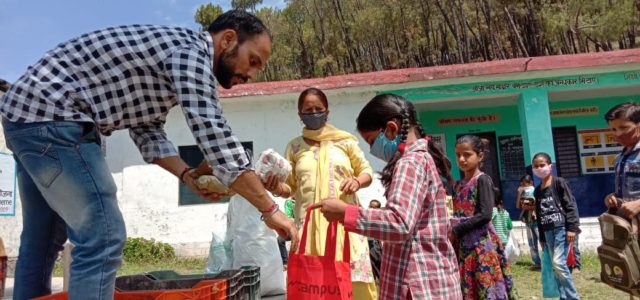
Our future programs include providing care packages to teenage girls from the very needy families on the hillside. During our survey, we identified 55 teenage girls in these scattered villages, to whom, with Jagori’s assistance we will make up and deliver packages. Now that the lockdown is easing, some people are able to start earning again, though for many work continues to be very limited. Therefore, whilst food supplies are no longer the main need for families, we continue to be concerned about the children and young people who are left at home while the schools and colleges are closed. The future seems so very uncertain to them and the amount of stress within families causes cases of depression and suicides to increase. Most of the schools provide some on line assistance with school work, but many of the poorer families in our area do not have access to smart phones and so will find themselves behind many of the others when the schools do re-open.
April – June: Spent on Covid Relief Projects: TOTAL: Rs. 166,619
02/05/2020: For emergency food packages for families in need: Rs. 20,000 (UK Trust)
24/06/2020: For emergency food packages for 88 local families: Rs. 25,000 (Local Donation)
26/05 – 26/06 : for school children’s nutrition packages 150 x 2: Rs. 71,950 (Germany Trust)
07/04 – 12/06 soap, masks, sanitiser, forehead thermometer: Rs. 17,654 (UK Trust)
20/04 – 17-06: Fuel & passes for relief supplies deliveries: Rs. 13,280 (UK Trust)
29/05 – 26/06: Activity and reading books for children: Rs. 18,735 (UK Trust)
The Community Centre has been quiet, so Salochana took the opportunity to treat, oil and polish the wooden floor in the community hall which is very difficult to do when it is constantly in use. Only Vandhana could be found, stitching masks on her own. We have seen very few children because the government told parents to keep their children at home. It has felt very strange not to be running any sports programs though we have been keeping the playground, which is well used by the local children, in good order. Except when parents bring their small children to the clinic, we have no contact with the anganwari children. When we started the school children’s nutrition program at the end of May, suddenly everyone was required to help purchase and package up the materials for distribution and the facility came to life again.
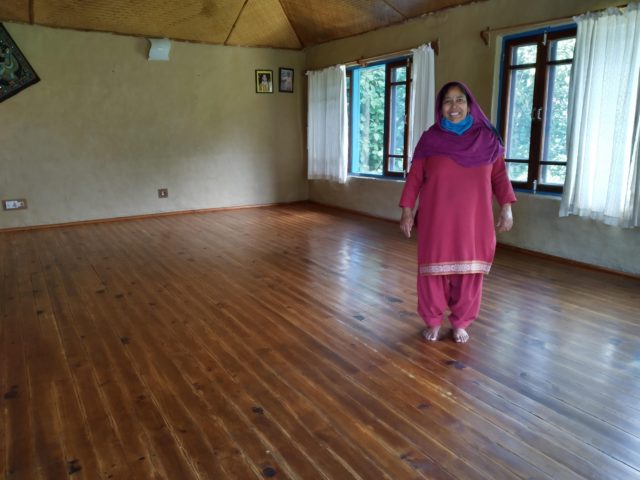
Gradually we have been contacting and interviewing candidates for our College Sponsorship Program. Six undergraduate students and 2of our MA students will be completing their courses and leaving us this year. Through our single women’s network we have been receiving applications since April, so in June when travel restrictions eased we started meeting and interviewing them. Because the school board exam results were delayed until July, and the college students have not yet sat their end of year exams, we have been unable to make a final selection of new students so far. However, each student who came for interview was introduced to the community centre computer room and library and encouraged to borrow books to keep themselves occupied. They are welcome to use the computers whenever they wish under the guidance of Vijay and Ankush. From the beginning of July we will call all the students, old and new to the centre for a half day a week in small groups, to get to know each other, become familiar with the computers and library and to help out on the farm. They can also help with making up the snack packages for the children’s feeding program and helping with deliveries. We are hoping college admissions will start in July with a view to the colleges re-opening in September.
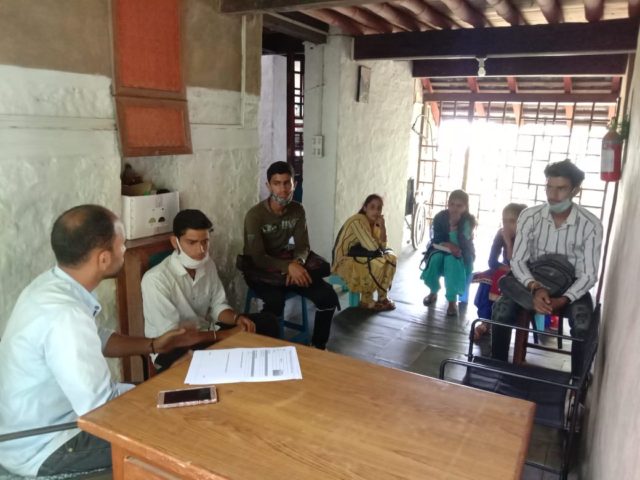
Workshop and training programs: Under the current restrictions we are unable to hold any workshops which gather together groups of people. We hope things will ease up by September and we will be able to catch up on the Wenlido, gender and Non violent communication trainings we had planned to hold this year. For the single women and our farming team we are planning a mostly outdoor training on the land in organic farming methods to be held in July. Dr Barbara and Dr Kusum have been busy doing an on line course to improve their acupuncture techniques which is very helpful for many of our patients.
Administration
After the initial lockdown, our office has functioned with a high level of diligence. We have completed last year’s accounts (pending audit) and organised reports and despite the uncertainty, sent proposals for the coming year. We have made several facebook posts and small videos, and news updates in an effort to keep our Trustees both here in India and abroad in touch with the situation here. Appeal letters sent to all our donors have met with significant positive responses. We therefore feel confident that we will be able to continue our work and respond to the needs of the community in the coming months. We would also like to invite everyone to visit our website which has been enhanced with pictures and charts from 2019-20 in advance of the annual review being published.
